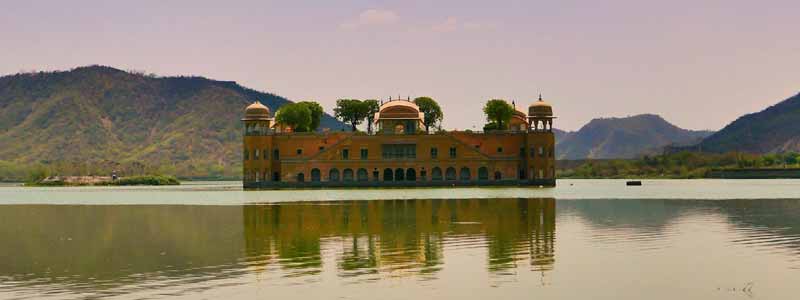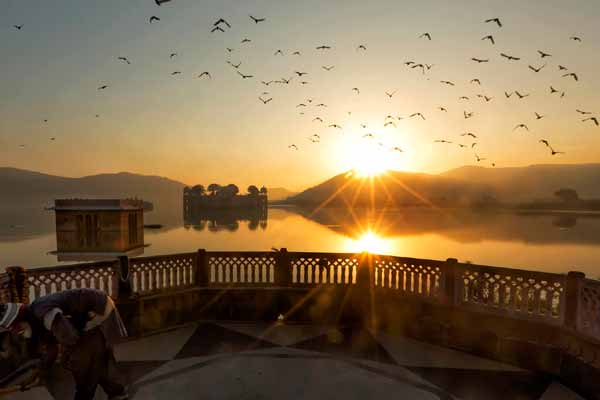Jal Mahal Jaipur literally means the “Water Palace”, but when it was built, Maharaja Madho Singh I did not intend to use it as a palace. Instead, it was supposed to be a hunting lodge for the king and his entourage during their duck hunting trips. The palace stands in the middle of the Man Sagar Lake in Jaipur city, and is a famous spot till date for sightseeing. The Jal Mahal is designed in a classic Rajput manner, with pink sandstone in a symmetrical style.
While a lot of people come to see the Jal Mahal Jaipur from the banks of the Man Sagar Lake, not many are aware of the technology and innovative design that has gone into building this ancient palace. On the surface, the palace appears to have one floor, but actually, there are four more submerged levels to the palace as its stone walls hold back millions of litres of water, and the specially designed lime mortar prevents water seepage into the palace, something which it has been doing for more than 250 years.
For now, the palace is not open to a majority of the public, so tourists flock to the banks of the lake to gaze at this magnificent structure. In the evenings, the banks are full of street food vendors as well, and the place gets pretty crowded as people visit what is possibly the most serene spot in the hustle and bustle of the city. The light colour of the sandstone walls creates a sharp contrast with the deep blue of the lake, and one can also see some green foliage sprouting from the inner courtyards of the palace, making it one of the most photographed spots in Jal Mahal Jaipur.

Jal Mahal, Jaipur: History
Jal Mahal Jaipur, one of the top places to visit in Jaipur, doesn’t have any recorded history about who built it or when. However, it is popularly believed that Maharaja Sawai Pratap Singh constructed Jal Mahal in 1799 to serve as a hunting lodge during his duck shooting trips. Some people also credit Maharaja Madho Singh I for the construction of this palace and date its origins back to the 1750s. Regardless of who built the palace, it was never meant to be used as a regular palace for living.
Later, the palace was renovated by Maharaja Jai Singh II of Amber in the 18th century. Over the years, the structure suffered subsidence due to partial seepage of lake water and waterlogging issues. After several years of deterioration and neglect, renovation works were carried out in the early part of the 21st century to restore the palace into its former glory. Though the palace and many of its features have been restored, its original terrace garden could not be salvaged. Plans are on to create a new terrace garden modeled on the rooftop garden of the famous Amer Palace in Jaipur.
Jal Mahal Architecture
Jal Mahal Jaipur stands in the middle of a lake that has a maximum depth of 15 feet and a minimum depth of 4.9 feet. It is a five-storied structure built in the Rajput style of architecture, with influences of the Mughal architectural style. While four of its stories remain under water, only the top story remains visible, giving you an impression that the palace is floating on the waters of the lake.
Jal Mahal has been constructed out of red sandstone. Four elaborate chhatris designed in octagonal shape adorn the four corners of the palace. A huge Bengal-style rectangular chhatri also exists on the roof of the palace. In its heyday, the terrace garden of Jal Mahal was decorated with arched passages.
Best Time to Visit Jal Mahal
The best time to visit Jal Mahal Jaipur is during the rainy season when the weather becomes even more pleasant. The rain imparts a great edge to the stunning look of the sandstone of this palace and makes it look extremely stunning. People especially prefer to visit this spot during October as the weather is extremely pleasant during this month.
Nearby Tourist Attractions of Jal Mahal
There are many nearby attractions near Jal Mahal that should be a must-visit in your travel list.
1. Amer Fort: Located at a drive of eight minutes from Man Sagar Lake, Amer Fort is one of the prime attractions of Jaipur. This is also known as Amber Fort, and it consists of serpentine staircases and maze-like passages that are a splendour on its own. It is clad in yellow and pink sandstone and is an architectural masterpiece that holds significant relevance in Indian history. This fort is so big that it will take around three to four hours to explore it in great detail.
2. Jaigarh Fort: Jaigarh Fort is another major tourist attraction located at a distance of a few kilometres from Amer Fort. It is perched on the hilltop of “Cheel Ka Teela” and this magnificent fort was commissioned by Sawai Jai Singh 11 to protect Amer Fort from the British rulers. It is a palatial structure surrounded by massive battlements and verdant greenery, and it is connected to Amer Fort through many subterranean passages. The fort currently houses the largest cannon on wheels that is also popularly known as Jaivana.
3. Gaitore: This is the most famous tourist attraction in Jaipur, extremely renowned for its blend of Hindu and Islamic style of architecture. Gaitore is popular for its chattris or cenotaphs which means the resting spot of the departed souls.
4. Jantar Mantar: Jantar Mantar is a renowned astronomical observatory consisting of nineteen architectural instruments and the largest stone sundial in the world. This is a UNESCO world heritage site and it stands as a structure of brilliance in the city of Jaipur. It’s extremely renowned among the visitors for its clever and smart use of geometrical patterns in the form of instruments.
5. Hawa Mahal: This is a distinctive landmark that every visitor stops by in Jaipur. Made with pink and red sandstones this beautiful palace sits on the edge of the city close to Jal Mahal Jaipur. Its beehive-like structure consists of small chhatris and carved dome-shaped pavilions to show the richness of Rajputana architecture. The most interesting aspect of this palace is that a light breeze passes through it all the time which is why it has been named as Hawa Mahal.
